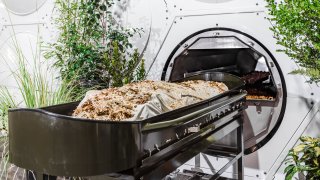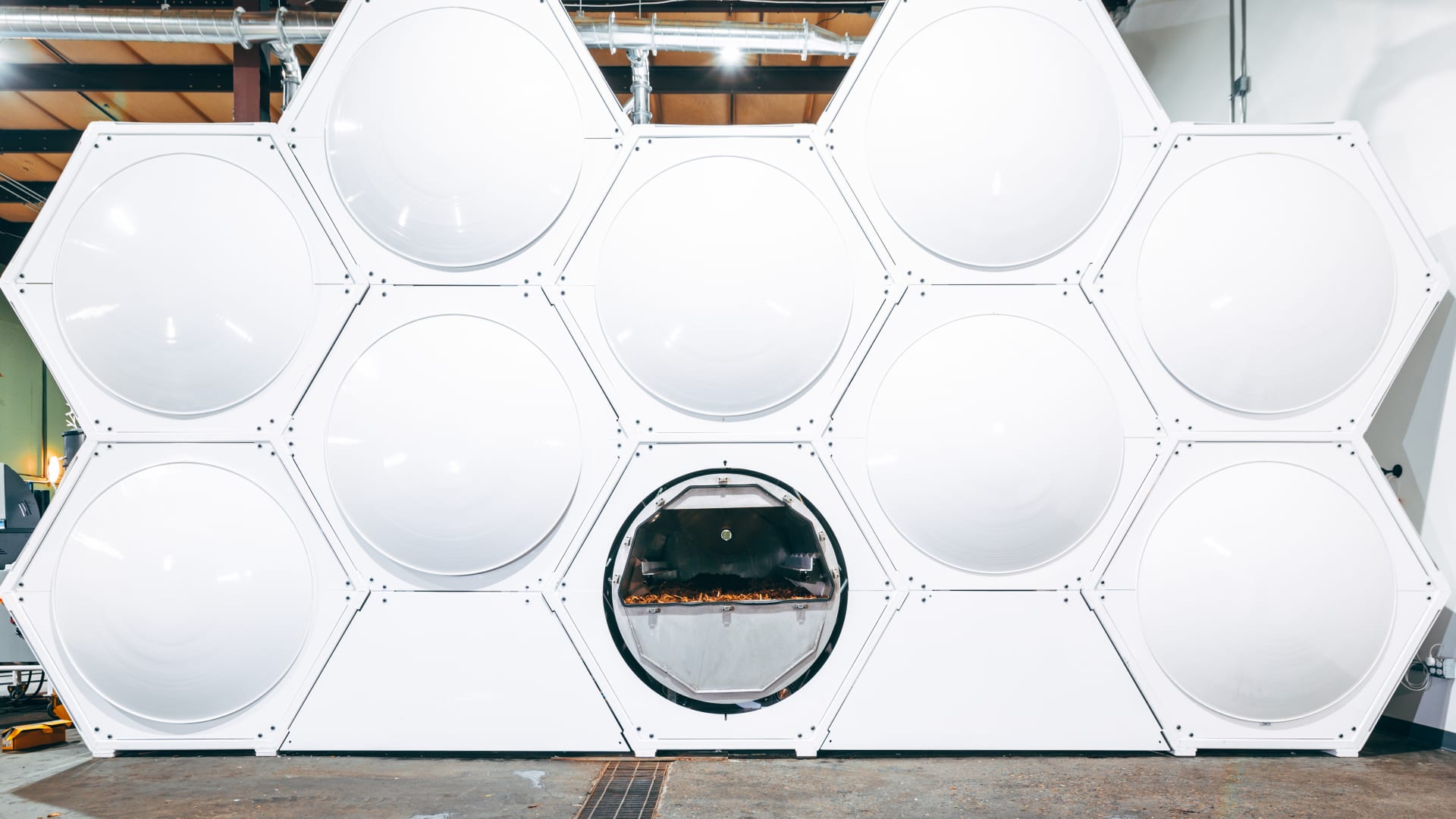
When Michelle Skaff dies, she's going to turn into dirt.
The 31-year-old is a client of Return Home, a Seattle-area human composting facility. Its futuristic-looking vessels full of organic material like straw, alfalfa and sawdust can turn human bodies back into soil by mimicking natural decomposition processes, the company says.
Skaff is very much alive, and plans to be for a long time. She signed up for the company's "pre-planning" services, starting a payment plan that'll enable her to eventually become compost.
The reason: Burials and cremations carry heavy environmental tolls. Burials require embalming bodies in toxic solutions, plus an indefinite use of land, and cremations result in millions of tons of carbon dioxide emissions annually.
We've got the news you need to know to start your day. Sign up for the First & 4Most morning newsletter — delivered to your inbox daily. >Sign up here.
Over the last 15 years, the rate of cremation in the U.S. almost doubled, to 57%.
Many of human composting's advocates are relatively young. The first five people to sign up for Return Home's pre-planning services were under age 35, according to CEO Micah Truman.
At Recompose, another Seattle-based facility, 25% of pre-planning clients are between 20 to 49 years old, says founder Katrina Spade. That's a lot for a service primarily devoted to the recently deceased.
Money Report
For some clients, these companies present unparalleled opportunity. Experts who study decomposition and the environmental impact of dead bodies agree.
"My first reaction was: Why haven't we done this before?" says Jennifer DeBruyn, an environmental microbiology professor at the University of Tennessee, Knoxville. "It's not really a new idea. It's just new-ish that we're applying it to humans."
Human composting is legal in six states and counting
On a rapidly warming planet, the somewhat fringe concept is inching toward the mainstream. Human composting, also called "natural organic reduction," is now legal in six states and counting.
Washington was first, in 2019. Colorado, Oregon, Vermont, California and New York soon followed. You don't need to live where it's legal to take advantage: Some of Return Home's clients will have their bodies flown to Washington after they die.
"We've got 29-year-olds in Miami signing up," Truman says. "Young people are going to teach us how to die better."
But legalization is only the first step, proponents say. The next big hurdle is getting more people on board with the concept.
That's where TikTok comes in.
Return Home, for example, has a robust presence on the platform, with more than 570,000 followers watching videos about what happens to the soil, where the bones go and other common questions.
It's an accessible way to learn the basics, clear up misconceptions and identify benefits beyond the environmental, says Tabitha Ogren, a 39-year-old TikTok user-turned-Return Home client.
Ogren was drawn to the idea of alleviating future burdens on her family, noting the expenses and stress of funerals she'd previously planned. "Not having to decide what to do after I pass away is ... that last gift I can give to them," she says.
The sign-up process was easy: Ogren called the company, discussed options for the final location of her soil and determined a payment plan. "They pretty much did 98% of it over the phone," she says.
Skaff, who used the same process, asked the company to call her again a few months later to make sure her decision wasn't rash. By then, she knew it felt right.
"No matter what happens the rest of my life — if I do have kids, if I don't have kids, no matter what my family looks like in the future — it's on no one else to [plan for my death]," she says.
Detractors are increasingly voicing their concerns
Nina Schoen first learned about Recompose in 2017, two years before human composting was even legal in Washington. Attracted by the sustainability factor, she became one of Recompose's first-ever clients after the facility opened to the public in 2020.
"Anything I can do today to have an impact [down the road] is meaningful," Schoen, 52, says.
But she knows it's a potentially controversial choice. Burials have helped humans process death for millennia, a process codified in multiple major religions. Cremation, popularized in America as recently as the Civil War, is notably common in modern-day Catholicism.
Schoen says she's openly discussed her decision with family and friends, including her 10-year-old daughter. She's also careful not to force her views on others. "There's so much tradition, and everyone's perspective here is different," she says.

That cultural headwind is intensifying. Despite what Truman calls the "remarkable" speed of legislation thus far, detractors are making their voices heard.
"It is inappropriate to suddenly introduce a completely different method, with no input from the public, religious communities, or anyone else outside of the state Capitol," the New York State Catholic Conference wrote in a letter to Gov. Kathy Hochul, three weeks before she legalized human composting in the state.
The New York State Funeral Directors Association, which represents more than 950 funeral homes across the state, also opposed the legislation — seemingly for a more practical reason.
"As written, it excludes funeral homes from having the option of owning [or] operating a facility necessary to provide this service to families," the organization tells CNBC Make It via email, adding: "We simply deserve the opportunity to provide the service to those families seeking natural organic reduction."
Truman cautiously likens the human composting industry's roadmap to the legal cannabis industry's ongoing expansion. Companies in both fields lack access to bank loans and other traditional methods of financing without federal legalization — but recreational cannabis, now legal in 21 states, has momentum.
Others aren't quite as optimistic. DeBruyn, for example, predicts that human composting won't become commonplace anytime soon.
That still won't stop a subset of people who want to "do better after death," she says. "The end product is some soil. We could always use more soil. At the end of the day, it's always going to be a better option than a graveyard."
Get CNBC's free Warren Buffett Guide to Investing, which distills the billionaire's No. 1 best piece of advice for regular investors, do's and don'ts, and three key investing principles into a clear and simple guidebook.
Sign up now: Get smarter about your money and career with our weekly newsletter






